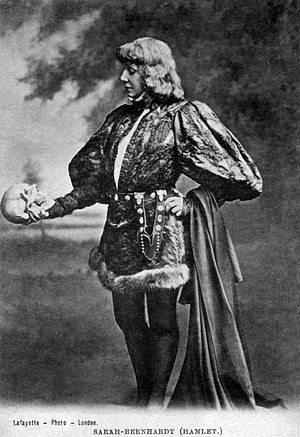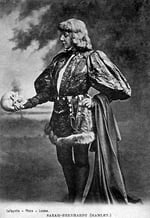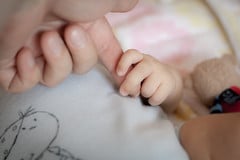
William Shakespeare’s play, Hamlet, is a story of tragedy; a tragedy that results in part because of a stasis that Hamlet nurtures when he should be taking action to avenge his father’s death. He has all the impetus one could need—his father’s ghost visits him early in the play urging him to “revenge his foul and unnatural murder” (I.V.25) at the hands of his brother, Claudius. Yet rather than acting, Hamlet hems, haws, and monologues the play away, inventing opportunities to provoke his uncle’s conscience rather than openly confront him. He even later finds Claudius in a moment of vulnerability as his uncle is at player, and delays even with a sword in his hand.
And how his audit stands who knows save heaven?
But in our circumstance and course of thought,
'Tis heavy with him: and am I then revenged,
To take him in the purging of his soul,
When he is fit and season'd for his passage?
No!
Up, sword; and know thou a more horrid hent:
When he is drunk asleep, or in his rage,
Or in the incestuous pleasure of his bed;
At gaming, swearing, or about some act
That has no relish of salvation in't;
Then trip him, that his heels may kick at heaven,
And that his soul may be as damn'd and black
As hell, whereto it goes. (III.3.82-95)
Hamlet justifies his hesitation with the hope that catching his uncle in the midst of more sin will ensure his tenure in hell, whereas killing him at prayer risks sending him to heaven. Yet this concern ultimately rings hollow given his constant inactivity and misdirection and, moreover, demeans the only motivation he should need—his murdered father.
I, like Hamlet, have been so haunted and remained largely apathetic.
I remember a day from my undergraduate career at Biola University when the entire campus was seething with anger, and with good reason. Or so I thought. Our passion was directed at a bi-plane flying above the campus trailing a banner with horrific images of aborted fetuses. My friends and I were scandalized, offended, and not a little self-righteous. What an audacious waste of money to hire a plane like that and brandish such images over a Christian campus. We all knew and believed abortion was wrong. We weren’t the ones who needed to be persuaded…right?
Not really.
The truth is, though I identify myself unambiguously as a conservative Christian, and though I affirm the sacredness of life, there’s a real sense in which I have been complicit in the abortion of children because I don’t actually do much to prevent it. And I’m not alone; I know many individuals who next month will go to the polls and console themselves with the belief that they have discharged their duty to the unborn because they voted Republican, just like they did four years ago.
Pro-life advocate Rolley Haggard recently wrote in Breakpoint Magazine, “pulpit silence on the abortion holocaust is nothing short of blasphemy.” But this silence is one shared, potentially, by every Christian—not merely our clergy—and so we all share in the blasphemy. So insular is my experience of Christianity that the last time I really had a discussion with someone about abortion was over ten years ago. This is America—you need never “inconvenience” yourself on account of your faith if you don’t want.
When I was in graduate school in 2008, a thunder-voiced rascal named Brother Jeb told everyone who passed by that voting for Obama would usher in the apocalypse (which I kind of thought he’d prefer). As something of an introvert, I have a strong aversion this type of vitriolic evangelism that, unfortunately, is widespread enough to be cliché. These people embarrass the cause of Christ with their hellfire (not to mention give Obama too much credit).
But my real problem was that I’d thought about abortion too much. I had myself convinced that to persuade someone that abortion was abhorrent, I needed to deconstruct the sexual revolution—a problem so colossal that what I needed to do was write a book, not have a conversation.
Let me explain. Many pro-life proponents fail to reckon systematically with the real problem of abortion—a problem that is, ironically, proclaimed rather baldly by its defenders. The problem is one of choice. Before a woman has chosen whether or not to have an abortion, she has chosen whether or not to have sexual intercourse, usually outside of marriage.[1] If there exist people vigorously engaged in defending a woman’s right to have an abortion—“to choose what’s right for her body”—then they are a small gang compared to the multitudes who will emphatically defend a woman’s right to sexual freedom and liberty. Of course, “freedom” and “liberty” are words that attempt a positive masking of the refusal to recognize and abide any sexual ethic found too stringent.
Every possible encounter with a pro-choice advocate became, in my mind, a commitment to explain that their attitude toward sexuality was merely one more statistic in a trend of physical, psychological, familial, social, and spiritual blight. But even the presentation of such overwhelming evidence offered no guarantee of persuasion. We often choose that which is injurious or foolish, despite the facts, because we so cherish the exercise of our freedom, however impaired. Fyodor Dostoevsky writes in Notes from Underground, “…there is only one case, one only, when man may purposely, consciously wish for himself even the harmful, the stupid, even what is stupidest of all: namely, so as to have the right to wish for himself even what is stupidest of all and not be bound by an obligation to wish for himself what is intelligent.”
As it happens, I do believe the sexual revolution should be undone, and books may be a way to help that along. But the real problem was that I justified my silence and inaction based on a flawed and incomplete perception of human choice, and I of all people really had no excuse to do so. I’ve spent several years now teaching literature, and one of the very first things I discuss with my students are the basic forms of persuasion as laid down by that venerable mind Aristotle. In paper after paper, I tried to hammer out the qualities and operations of the emotional, logical, and ethical arguments. But when I turned to the problem of abortion, I believed that since the pro-choice ethos so differs from pro-life, I could only resort to the logical argument . And on account of the likes of Brother Jeb, I dismissed the prospect of the emotional argument entirely.
It was and is this dismissal of the emotional argument that allows so many unborn children to be murdered. To disregard the emotional element of our arguments and conversations is to flagrantly ignore a core part of our humanity. We are, after all, neither automatons nor Vulcans. We are delightfully vulnerable to the frailty of beauty and the power of images to the same degree we are so often impervious to the declaration of statistics. I think part of the reason Biola’s campus was teeming with such heightened fury was because the banner portrayed images of dismembered fetuses, not the number “50,000,000.”
This is what makes Juno so effective. The critical moment in the movie comes when Juno MacGuff, a young pregnant woman (played by Ellen Page), approaches an abortion clinic a few months into her first trimester and encounters a schoolmate named Su-Chin in the parking lot shouting “All babies want to get borned!” Juno appears unfazed by these declarations (as well as the sign that reads “No babies like murdering”). She hesitates, however, when Su-Chin tells her that her baby probably has fingernails. It is the contemplation of fingernails that ultimately sends her running from the clinic.
I realize that the movie dramatizes the encounter. Su-Chin is comically awkward and Juno’s dialogue is self-consciously precocious and witty. But her reaction to the image of a fingernail speaks to the persuasive power of a compassionate and emotional argument. Su-Chin doesn’t try to vilify Juno; she directs Juno’s attention away from feeling defensive to the contemplation of an easily imagined feature. This image of the fingernail acts as a catalyst, and Juno decides to bring her baby to term and give it up for adoption.
Those images, trailing behind that plane, have finally gotten to me. The pilot knew what he was doing. So many Christians, especially academic or intellectual Christians, excuse themselves from the plight of the unborn because, like Hamlet, we spend too much time thinking about the theoretical ins and outs of the issue. The weight of the philosophy, the laws, and the embarrassing public image of Christianity become too great a burden to bear.
Don’t get me wrong, the sexual revolution still needs to be undone. But in the meantime, I can tell a mother in distress that her child has fingernails. I can speak a word of kindness to a woman who may save the life inside her because she is human and may respond not only to reason, but to beauty.
Phillip Aijian earned a BA in English from Biola University in 2006 and later pursued graduate studies at the University of Missouri where he completed an MA in Creative Writing in 2010. He is joyously married, and is currently pursuing a PhD in English at UC Irvine, and is working on a poetry manuscript and his third studio album.
[1] The National Abortion Federation website reports “Married women are significantly less likely than unmarried women to resolve unintended pregnancies through abortion.”


